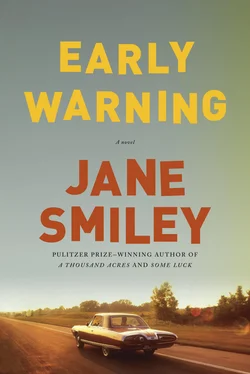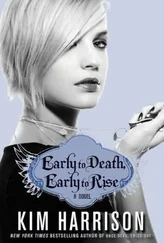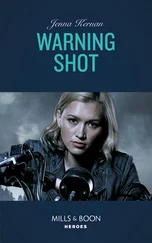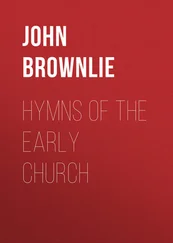Jane Smiley - Early Warning
Здесь есть возможность читать онлайн «Jane Smiley - Early Warning» весь текст электронной книги совершенно бесплатно (целиком полную версию без сокращений). В некоторых случаях можно слушать аудио, скачать через торрент в формате fb2 и присутствует краткое содержание. Год выпуска: 2015, Издательство: Knopf, Жанр: Современная проза, на английском языке. Описание произведения, (предисловие) а так же отзывы посетителей доступны на портале библиотеки ЛибКат.
- Название:Early Warning
- Автор:
- Издательство:Knopf
- Жанр:
- Год:2015
- ISBN:нет данных
- Рейтинг книги:5 / 5. Голосов: 1
-
Избранное:Добавить в избранное
- Отзывы:
-
Ваша оценка:
- 100
- 1
- 2
- 3
- 4
- 5
Early Warning: краткое содержание, описание и аннотация
Предлагаем к чтению аннотацию, описание, краткое содержание или предисловие (зависит от того, что написал сам автор книги «Early Warning»). Если вы не нашли необходимую информацию о книге — напишите в комментариях, мы постараемся отыскать её.
, a national best seller published to rave reviews from coast to coast.
Early Warning — читать онлайн бесплатно полную книгу (весь текст) целиком
Ниже представлен текст книги, разбитый по страницам. Система сохранения места последней прочитанной страницы, позволяет с удобством читать онлайн бесплатно книгу «Early Warning», без необходимости каждый раз заново искать на чём Вы остановились. Поставьте закладку, и сможете в любой момент перейти на страницу, на которой закончили чтение.
Интервал:
Закладка:
So now she was at a mixer, standing in the corner, dabbing her eyes with a paper napkin, because every boy reminded her of Tim — not because they looked like Tim, but because they filled spaces that her brother should have filled. One gawky kid after another walked across the dance floor, dribbling his beer, his Adam’s apple poking out, and his mouth half open. Always, Debbie had known that Tim was better-looking than she was, because the eyes of strangers slid past her and rested on him. Always, she had known that he got away with murder and so she had to do everything right. Always, she had been petty and irritable. Well, now she had taken Psychology 101, and Family Dynamics, and Elementary Freudian Theory, and she had identified herself as the wicked stepsister whose foot was too big for the glass slipper no matter what size the glass slipper was. In other words, she was a realist, surrounded by fantasists.
One of the gawky boys, this one at least six four, came to a halt in front of her and said, “You dance?”
“I have danced,” said Debbie.
“I danced, I have danced, I had danced, I might have danced, I could have danced, I should have danced.”
“English major,” said Debbie.
“Might you dance in the near future?” said the boy.
Debbie stepped away from the wall. The song was “Ruby Tuesday.” Debbie moved around, and the kid moved around near her, but not too near her. The song changed to “Georgy Girl,” which Debbie didn’t like, so she stood still for a moment, then backed away. Unfortunately, he followed her.
After ten the same evening, Debbie was still talking to this guy, whose name was David (not Dave) Kissell, a junior at Wesleyan. He already knew her entire name, Debbie Manning, and he also knew that her brother Tim had been killed in Vietnam, something only her best friend and her roommate knew. David Kissell’s eyebrows had not risen. He had not backed away from her in either horror or disapproval, and when the tears came, he had supplied her with a clean paper napkin and a fresh beer. He said, easy as you please, “Come with me to the march. Someone in my dorm has a car. Three of us are going, and you can come along.” Debbie said, “I don’t know. Maybe.” And then they went back into the dining hall and danced to “You Keep Me Hangin’ On,” and David said he was from Long Island and had seen Vanilla Fudge live. When he walked her back to her dorm in time for midnight curfew, he kissed her not on the lips but on the forehead.
He met her at the corner where her ride to Middletown dropped her off. She saw the three other girls stare at him for a moment and then dismiss him — he was wearing jeans and a sweatshirt, and his hair was below his collar (though clean — he smelled good). He took her little bag, and they walked to a pizza parlor. There were two guys he knew there, about halfway through a sausage pizza with mushrooms. Debbie sat down. She had the shortest hair at the table, and the most boring color, plain brown. The guy across from her was wearing a long wool army-surplus coat with a belt, even though it was April, and he had a carefully trimmed mustache. He was clearly the leader. David introduced her to him first — Jeff MacDonald.
They went back to Jeff’s room, and pretty soon the boys were passing her a slender cigarettelike object which she knew was a joint. She took it, but when she sat staring at it, David gently removed it from her fingers and passed it to Jeff, who nodded thoughtfully and took another “hit.” He had a nice stereo, and they were listening to the Electric Prunes.
The plan was to leave for New York by six, so she slept in David’s single bed with him, which, in spite of years of slumber parties, she could not say she was used to. But he was nice, and anyway, he took a sleeping pill.
Jeff MacDonald knew somebody on East Seventy-third Street, so they left the Falcon there and walked to the park. Even by 9:00 a.m., Manhattan was so busy that Debbie had to grab David’s hand so as not to lose him. When they got to the Seventy-ninth Street entrance, a small sign directed them to gather with other students, but it looked to Debbie as though everyone was milling around together. The official signs were large and white — Debbie thought the one that read “Children were not born to burn!” was more effective than “Stop the Bombing!” Other signs were homemade: a pair of twins had two signs, “Hey Hay LBJ How” and “Many kids U KILL 2DAY?” They marched shoulder to shoulder through the crowd, deadly sober and carefully holding the signs so that they could be read together. There were families, too — couples with babies in carriages, old ladies, even some men in old army uniforms from the war. Just before eleven, she and David followed Jeff to the rocks near the bottom of the Sheep Meadow. There Jeff climbed on a rock and burned his draft card with a lighter, while she, David, and the other boy, Nathan, formed part of the human chain protecting the small group of draft-card burners. Debbie looked over her shoulder to see if they were going to be rammed by police, but she could see no police, only more protesters lining up behind her, shouting, as the cards burned. When his card was a blackened ash falling into a can, Jeff raised both his arms in a salute, and everyone shouted “Hell, no! We won’t go! Hell, no! We won’t go!” Then everyone got organized and headed downtown.
On Park Avenue right before Forty-eighth Street, Jeff MacDonald got an egg right on the forehead. The egg broke and splattered over his glasses, and David almost laughed but didn’t. Debbie ducked — another egg hit the ground in front of her feet. Then they all started looking up and hurrying a little bit, but there was no panic. Jeff just put his glasses in his pocket and kept shouting. They passed three guys with short hair, holding a sign that read “Hang the potesters!” “Protesters,” Debbie wanted to stop and point out, was spelled with an “r.” But the march pressed forward, so she just raised her fist and gave them the finger.
Debbie didn’t start crying until Phil Ochs started singing. Debbie was not a screamer. She had one Beatles album, and she liked to listen to the acoustic Bob Dylan. Her sole pop-music memory was from three years ago, her freshman year, at a Peter, Paul and Mary concert, when she had gone up afterward to get an autograph from Paul. She was six people back in the line; it was late; she yawned, and Paul saw her. He looked right at her and sang, “On a Desert Island.” But Phil Ochs was handsome and graceful, and he had a rich voice, even in this crowd. And when he looked out at them and sang “Is there anybody here who’d like to wrap a flag around an early grave?” she decided that he was singing to her, for Tim, and she burst out — wa-wa-wa — very embarrassing, so upsetting that David Kissell put his arms around her. And he followed that with “I Ain’t Marching Anymore.” She heard David whisper the words “Her brother was killed,” and then there were a few tentative pats on her shoulder. Would Tim have come to this march? Debbie had no idea. But maybe his ghost would, knowing what it knew now.
—
JANET, TOO, was at the march. The week before, she had gotten a letter from Aunt Eloise. Aunt Eloise was interesting to Janet, if only because every time her name came up Dad laughed and Mom said, “Oh, Frank,” then laughed, too. They thought Aunt Eloise was an embarrassment, but she wrote more faithfully than either Dad or Mom.
Dear Janet—
Thanks for your letter! I’m always happy to read anything you have to say, and no, I am not at all tired of you talking about your cousin Tim or telling me how much you miss him! You should miss him. I consider him a murder victim, not murdered by the Viet Cong, but by Lyndon Johnson and the rest of the imperialist pigs who are perpetrating an illegal war that they will never win. I know that you don’t hear such things at THE MADEIRA SCHOOL, but you are old enough to know the truth. When I was your age, I was walking around the farmhouse, staring out the windows, and wondering what was out there. Now I know, and I can’t say that it has made me happy, but it has made me strong. There have been many things that we have not been able to do anything about, but the Vietnam War is something that we can do something about. There is going to be a march in New York on April 15, a Saturday (here in San Fran, too). You should think about how you might get to that march. I don’t know the rules at your school. But there is never anything wrong with breaking rules, and in fact, you should practice as soon as you can. You are a good girl, which is a convenient cover story for you. No one expects you to misbehave, so, at least for a while, you can judiciously misbehave (not sex and drugs, if you know what I am getting at and I hope you do not).
Читать дальшеИнтервал:
Закладка:
Похожие книги на «Early Warning»
Представляем Вашему вниманию похожие книги на «Early Warning» списком для выбора. Мы отобрали схожую по названию и смыслу литературу в надежде предоставить читателям больше вариантов отыскать новые, интересные, ещё непрочитанные произведения.
Обсуждение, отзывы о книге «Early Warning» и просто собственные мнения читателей. Оставьте ваши комментарии, напишите, что Вы думаете о произведении, его смысле или главных героях. Укажите что конкретно понравилось, а что нет, и почему Вы так считаете.











